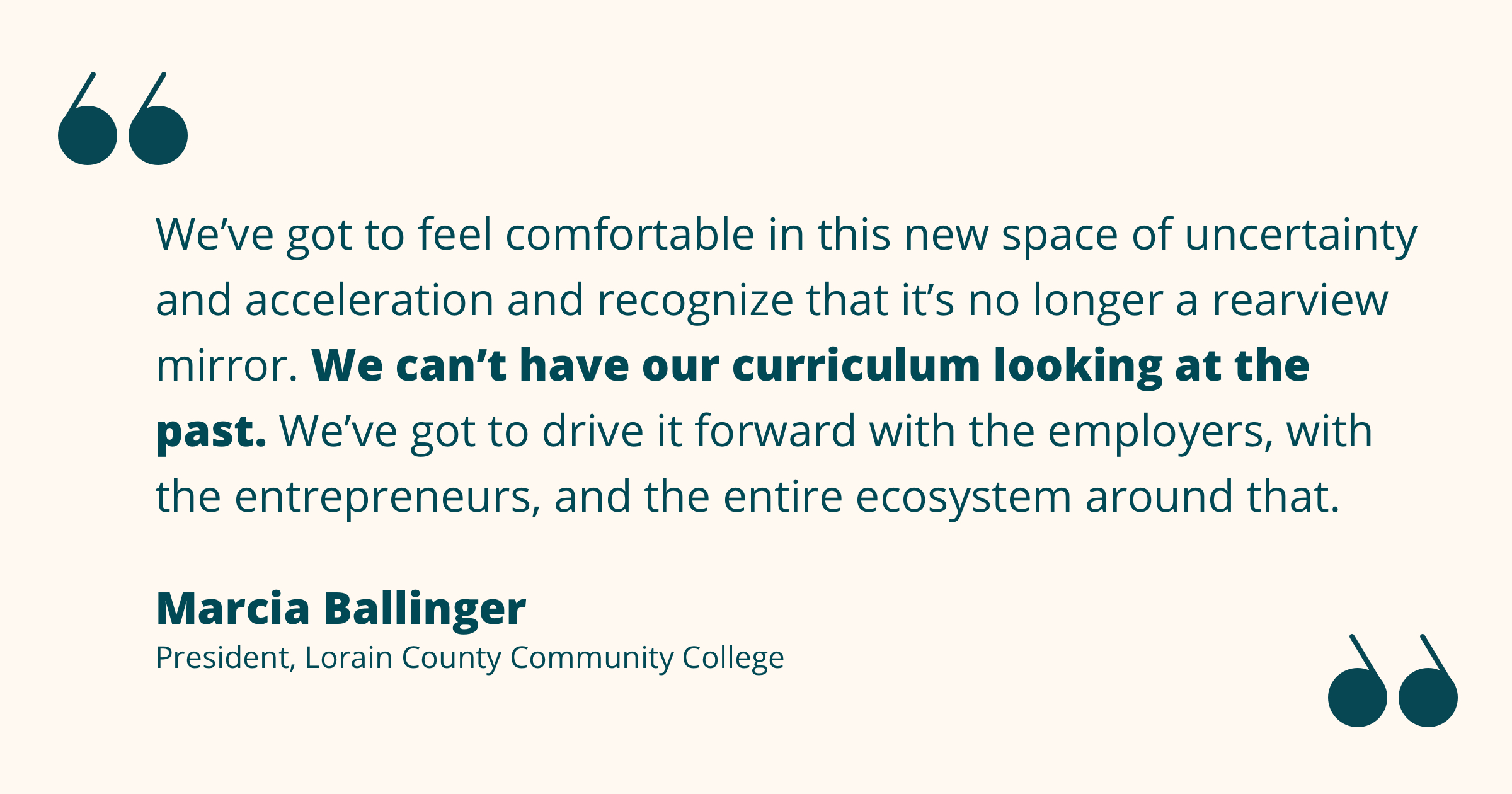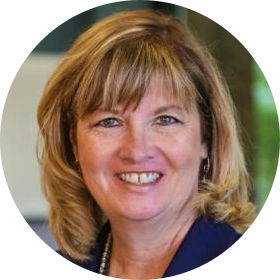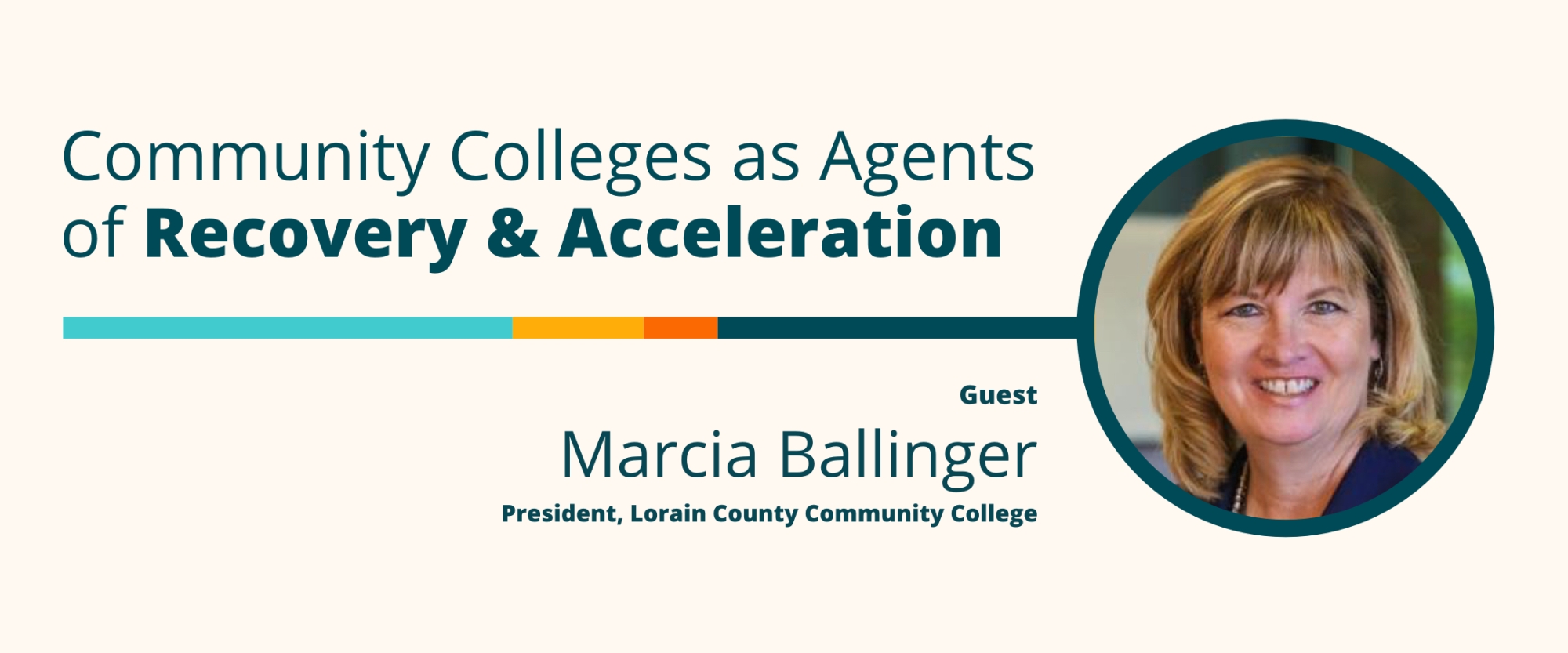Note: This interview, Episode 16 of the Weekly Wisdom Series, originally aired on August 17, 2020 as part of the University Innovation Alliance’s Innovating Together podcast, appearing live on Facebook, Twitter, and LinkedIn.
The University Innovation Alliance (UIA) is proud to present the Innovating Together Podcast, created in partnership with Inside Higher Ed. I'm the UIA's Executive Director, and my co-host for this episode was Madeline St. Amour, who covered the community college beat for Inside Higher Ed. Our guest for Episode 16 of Innovating Together's Weekly Wisdom series was Dr. Marcia Ballinger, award-winning President of Lorain County Community College in Elyria, Ohio. Dr. Ballinger shared her wisdom about the special ways in which community colleges have met their students' needs during the COVID-19 pandemic, as well as the role of these local institutions in the regional and national economies of the 2020s.
The Critical Role of Community Colleges
President Ballinger was eager to define the role of community colleges as engines of economic recovery during the pandemic when so much of the focus is on four-year institutions.
"Part of our role is being that launch pad for individuals during the transformation we find ourselves in," she told us. "We need to ensure that our employers have the qualified trained workforce, and do that very, very quickly. We have so many adults throughout Northeast Ohio who are high school graduates but don’t have any industry-recognized credential or a degree. In an economic recession, by being that community partner responding to what needs to be done, we're helping to drive what needs to be done."
Along with high school grads or younger students in the college's dual enrollment program, Lorain C.C.C. serves an adult student population that's very different from four-year institutions. "To give you an example," President Ballinger said, "this fall we have unveiled 21 short, short-term training programs that all have an industry-recognized credential built in, because we know for the adults in our community who we serve, getting them the skills and education that they can start to make a meaningful wage is extremely important. So the diversity of the students that we serve at L.C.C.C., and at community colleges across the country, really are representative of our local communities. We’re microcosms of those communities."
Addressing Student Needs and COVID Safety
We asked President Ballinger, a recognized national leader in student success, to share some of the best practices that she's implementing at Lorain C.C.C.
"We have been laser focused on basic needs," she began. "We had many components previously: a food pantry, mental health services, emergency aid. We created at the very front of our campus an integrated holistic center. Little did we know a year ago that this was going to take on even greater priority and prominence for our students. So we made a commitment when the pandemic began that we would not allow a student to go hungry or without technology. And so we really needed to create more opportunities for funding, working with our Lorain County Community College Foundation and other partners in the community to braid some of the funding together. We kept our food pantry open and encountered a 34% increase in the utilization of that. We know that if we can’t meet students where they are, we had to change the paradigm from 'Are our students college-ready?' to 'Is our college student-ready?' We have a phenomenal student navigator that is able to cut through anything that they may need. We’re just committed to putting students first.
"And so taking a pulse with our students to continually ask them what they need, how we can help them, we’re just continuing to do that," she went on." We worked hand in hand with our jobs and family services, as well as the workforce development system, and have a very holistic, integrated approach with them that has been enhanced during this time. The braiding of funding – SNAP, for example – lets us provide students with books, technology, or emergency aid at a time when it is most needed."
COVID has added another layer of challenges that President Ballinger is prepared to meet. "We will have 80% of our education online beginning next Monday, very similar to what we had over the summer," she told us. "We have unveiled something called Online Live that provides structure for some students. So it will be done remotely, but at a specified day and time of the week with the instructor being live. And then, for the courses that are lab-based or have accreditation requirements, we have put in place all of the safety protocols to ensure that everything is spaced out. We have a mandate in Ohio for everyone to wear masks. And we're following all the other safety protocols with regard to temperatures being taken at a station of different symptoms. So while we certainly are taking every precaution, it’s our intent and we place the health and safety of our students and of our entire campus community at the very forefront, and that has guided our planning throughout the pandemic."
Communication Is Key
President Ballinger was emphatic about the need for communication during a crisis of this magnitude. "I don’t think you can over communicate," she stated. "And I think the importance of communication is to provide reassurance that you are listening, and that we do have a plan in place, and we are all going to get there together. Creating the optimism, I think, is extremely important. We don’t have all the answers, but I would say that part of our style and culture that we have at Lorain County Community College is one around care and open communications."
She shared an example: "I had an extraordinary experience about a week and a half ago when our staff council was preparing for the new year. I came to meet them on campus as part of a socially distanced picnic, and they surprised me with a transparency and communications award. And I have to say, none of us do anything for an award. In my career, having that from them during that time truly has been one of the highlights in my nearly 30-year career."
Community Colleges in an Age of Acceleration
President Ballinger has reason to be positive about the future of community colleges. "When the pandemic began in March," she recalled, "we actually were on the election ballot for our local operating tax, which comes up once every ten years. As timing would have it, Election Day was rescheduled for later in the spring, and we were very concerned that we would gain the support that we needed. Instead, we had an overwhelming highest percentage of voter support ever. It was 60%. Our community, and I believe other communities across the country, see their community colleges as part of the solution going forward. And so partnering with others really takes us back to our roots when community colleges were created to be responsive to those community needs. And then certainly the unbelievable random acts of kindness and positive increased engagement with our students, with our faculty, doing it so quickly in terms of how we’ve had to change, I think we have proven to ourselves that we are even more agile than we’ve ever been in this age of acceleration that we’re encountering at the same time."
President Ballinger understands that the U.S. economy is shifting rapidly because of the pandemic, and that community colleges have a role in shaping the workforce. "We had identified, about a year before the pandemic hit, eight different mega trends and drivers that we saw impacting Northeast Ohio as well as our globalization of higher education," she explained. "And so we brought together a vision network, and we’re continuing that communication with members who comprise leadership across all different industry sectors. Over the past two years, we created our first applied bachelor’s degree in micro electromechanical systems, which cut across all industries. And in this new time where people can work remotely, how do we enable the right conditions to help launch careers or retrain in new careers? And so I think the gig economy takes on an even greater perspective during this time.
"In Northeast Ohio, our intermediary for economic development, Team NEO – I serve as co-chair of the talent development council – is looking at the gaps that are existing in all industry sectors for the highest demand and opportunities for the region. So we're keeping the eye on the future. We’re inventing it as it’s happening. I read, I think it was in the McKinsey Report, that the amount of change that happened in the first four months of the pandemic is equivalent to a ten-year change over that time. So truly, 2030 is here now. And we’ve got to feel comfortable in this new space of uncertainty and acceleration. I think it’s never been greater than it was when Gutenberg invented the press. And we’ve got to be comfortable in that space and recognize that it’s no longer a rearview mirror. We can’t have our curriculum looking at the past. We’ve got to drive it forward with those employers, with the entrepreneurs, and the entire ecosystem around that."

Teamwork Starts Here
But President Ballinger hasn't lost sight of the near term. "We believe that we have all been in this together since March," she added, "when we were closing down and moving very, very quickly to a different world. And so through perseverance, and grit, and determination, and leaning in really hard to what matters most, we’re ready to go for the fall semester."
Links Mentioned in This Episode
• Lorain County Community College
• SNAP (Supplemental Nutrition Assistance Program via the U.S. Dept. of Agriculture)
• Online Live (L.C.C.C.'s distance learning platform)
• Team NEO (an economic development council for Northeast Ohio)
• McKinsey Report (McKinsey & Company's online publication about analytics)
Bios of Guest and Co-Hosts

Guest: Marcia Ballinger, President, Lorain County Community College
Dr. Marcia Ballinger became the fifth President of Lorain County Community College (Elyria, Ohio) in 2016. Under her leadership and through her deep commitment to student success, Lorain County Community College received the 2018 American Association for Community Colleges Award of Excellence in Student Success. Dr. Ballinger has spent 30 years in community college leadership roles that have advanced student success, workforce and economic development, strategic planning, and institutional advancement. She is also a recipient of the Aspen Presidential Fellowship for Community College Excellence. Dr. Ballinger is passionate about empowering a thriving community where every student dream matters. She is deeply engaged in the student completion movement at the state and national level, serving in leadership roles for the Bill & Melinda Gates Foundation's Completion by Design project, Achieving the Dream, and Jobs For the Future Policy Leadership Trust for Student Success. Dr. Ballinger has served for years on numerous state and regional higher ed committees, as well as such entities as the Fund for Our Economic Future, Northwest Bank Advisory Board, and Workforce Institute of Lorain County. She is also President of the Lorain County Community College Foundation and while serving as Vice President of the L.C.C.C. Foundation grew the organization from $12 million in assets in 2004 to nearly $50 million today. Dr. Ballinger holds a Ph.D. in Education – Community College Leadership, Walden University. She is also a proud alumnus of L.C.C.C.’s University Partnership Program, having earned her M.B.A. from Kent State University. She earned a B.A. in Journalism from Indiana University of Pennsylvania.

Co-Host: Bridget Burns, Executive Director, University Innovation Alliance
Dr. Bridget Burns is the founding Executive Director of the University Innovation Alliance (UIA). For the past decade, she has advised university presidents, system chancellors, and state and federal policy leaders on strategies to expand access to higher education, address costs, and promote completion for students of all backgrounds. The UIA was developed during Bridget’s tenure as an American Council on Education (A.C.E.) Fellowship at Arizona State University. She held multiple roles within the Oregon University System, including serving as Chief of Staff and Senior Policy Advisor, where she won the national award for innovation in higher education government relations. She was a National Associate for the National Center for Public Policy and Higher Education, and has served on several statewide governing boards including ones governing higher education institutions, financial aid policy, and policy areas impacting children and families.

Co-Host: Madeline St. Amour, News Reporter, Inside Higher Ed
Madeline St. Amour served as a news reporter with Inside Higher Ed, covering community colleges and nontraditional students from September 2019 through January 2021. She previously worked as a higher education reporter at the Daily Camera in Boulder, Colorado; a public safety reporter at the Longmont Daily Times-Call in Longmont, Colorado; and a reporter at the Morning Sentinel in Waterville, Maine. She earned a B.A. in Communication and Media Studies from Fordham University, spent a semester in Spain studying Spanish at Universidad de Granada, and then earned a second B.A. in Journalism from the State University of New York at Albany in 2016. Madeline currently works as an Executive Assistant at ACE-AFSCME Local 2250.
About Weekly Wisdom
Weekly Wisdom is an event series that happens live on Facebook, Twitter, and LinkedIn. It also becomes a podcast episode. Every week, we join forces with Inside Higher Ed and talk with a sitting college president or chancellor about how they're specifically navigating the challenges of this moment. These conversations will be filled with practicable things you can do right now by unpacking how and why college leaders are making decisions within higher education. Hopefully, these episodes will also leave you with a sense of optimism and a bit of inspiration.
Rate, Review & Subscribe
Learn why hundreds of people have rated this new podcast 5 stars! Please join others and rate and review this podcast. This helps us reach and inform more people -- like you -- to help increase the number of college graduates in the United States.
Click here, scroll to the bottom, tap to rate with five stars, and select “Write a Review.” Then be sure to let us know what you loved most about the episode! Also, if you haven’t done so already, subscribe to the podcast. We’ll be adding a bunch of bonus episodes to the feed and, if you’re not subscribed, there’s a good chance you’ll miss out.

